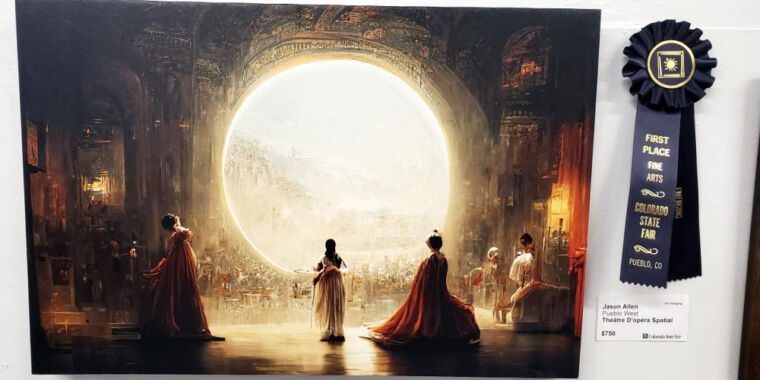I’m kind of mixed on this, because I think AI art is pretty cool, but I also hate our current copyright system. I kind of agree with the copyright office that images generated by a prompt should not be covered by copyright. What if I just type in “cat” and set the seed to 1, and try to copyright that? What if I copyright the image for EVERY seed with that prompt? Literally anyone else could easily generate the exact same image, and are they going to be in violation of my copyright now?
It gets really complicated though. What if I draw a sketch and then feed it into stable diffusion to flesh it out further? Then I do extensive inpainting across the whole thing, then I take it to Photoshop and do further edits. At this point, I think it’s fair to say this is an original image of my own creation, which should be eligible for copyright protection.
I can understand partially your argument, and I’d agree the work you personally do is your own, but the art generated by the AI is not.
It’s as much your art as the person who googles extensively to find images that they ten cut out and place into your art. It’s as much your art as taking it to another person, asking them to make the edits, and revising.
Now, if the image you get from google is creative commons, and the revision artist agrees to signing off their rights, you’d be able to copywrite your work. I’d agree to the same situation with AI, if the people who’s art makes up the model agree to that circumstance, you should be able to copywrite. Otherwise you’re just taking credit for others work because you described it well enough while ingraining it into your own.
No specific person’s art is being put into my generated image, unlike if I were to copy an image from Google. If a model is trained on 1 trillion images, then every single one of those images influenced the weights in the model which then resulted in the output.
But my argument there is that when the generation becomes very integrated into the workflow as a tool, then it can be nearly impossible to separate out what was actually created by me vs what the ai did.
I disagree, you can see signatures and figures drawn by individual artists in even the largest models of today. Also, only a fraction are what you specified
Though trillions may be used, only billions are of dragons, millions of clocks, and thousands of something more specific or in certain style. A picture of a cat has nothing to do with the prompt “rick and Morty inflation porn, big feet, (feet:1.3), cartoon, drawn, colourful”
I’ve worked in the AI field specializing in vectorization, a method of creating automated systems to catch failures, and it’s clear to me what gets imprinted onto the nodes is just other peoples work. The line-work, colouration, composition, etc. on a particular output will be from a tiny fraction of the models training and will be, individually per addition or edit, directly taken from a handful of images.
This is why you can get text based or code based AI to word for word output some of their trained work. Same with image based, though only pieces again.
All the actual decision making, the colouration, the composition, line-work, perspective, base stylistic choice, etc. will be made by another person or people before being detected by the AI and output when the correct input (prompt) is given.
To be clear, If I had called Pokemon fish whenever you put in the word fish something stylistically Pokemon would be output with nothing to do with fish. It’s not learning what our prompt actually means just what gets it a head pat from the dev.
It’s not just learning what a word means and outputting a new image, it’s finding a way to output the original data in a way that makes somebody like me, an AI dev, say “yeah that’s about right”. That’s all
Once more, because each time I stare I hate AI I get misinterpreted, I hate that it’s taking without permission. If that is granted then it’s perfectly moral.
I agree that AI work should not have copyright protection. Even with human intervention it still collects data, without expressed permission, from numerous sources.
This will actually protect smaller artists. It will prevent giant companies from profiting from their work without credit or payment.
I agree that AI work should not have copyright protection. Even with human intervention it still collects data, without expressed permission, from numerous sources.
Generative AI models could be trained using only on public domain and royalty free images. Should the output of those be eligible for copyright, but not if they also had unlicensed training data?
It seems there two separate arguments being conflated in this debate. One is whether using copyrighted works as AI training data is fair use. The other is whether creative workers should be protected from displacement by AI.
But that won’t happen. Companies have money, and by extension, lobbyists. It doesn’t matter what the general consensus is, they will get their way.





